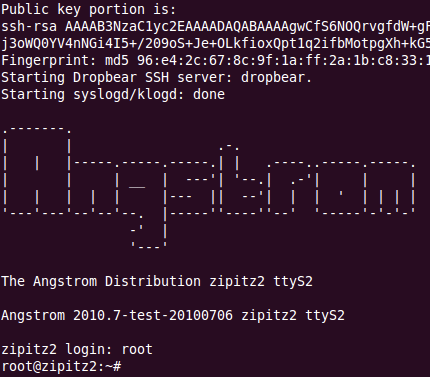
OpenEmbedded was the original starting point for unlocking Linux on the Zipit Z2. Nowadays there are plenty of userlands floating around out there but if you want to take things even further on your Zipit, you’ll probably need to build OE.
OpenEmbedded will allow you to compile packages and actually build your own custom rootfs from the ground up. You’ll be able to use your fastest desktop system to cross compile packages for your zipit and even build a custom kernel for your zipit as long as you are using U-boot.
To get started I’m simply going to expand on Sweetlilmre’s directions.
- Make sure you have like 80 gigs free on your hard drive. I would suggest using Debian or Ubuntu as your base OS for these directions.
- At command prompt, go to your home directory and type “svn co https://openzipit.svn.sourceforge.net/svnroot/openzipit/oe”
- CD to the OE directory
- type in “make” and wait…
At this point, you may be getting a list of dependencies that are broken so you might need to fire up apt-get and get some packages. After you are able to successfully “make”, then you should be ready to get started. (That’s right, that was just the beginning)
- Run “./oe_zipitz2.sh” This script sets up the environment to start building. It should change your bash prompt to a green one. That alerts you that you can start bitbaking.
- Now you need to build the base-image so run “bitbake base-image” and wait…
Many hours later, your base-image should be built and ready to go. Just make sure you have no errors waiting for you on the screen. If everything went well, you should have a rootfs and kernel waiting for you in “~oe/zipitz2-tmp/deploy/glibc/images/zipitz2”. There should be file called base-image-zipitz2.tar. You will need to untar that file to a blank sd card formatted ext3. Use the “-pxvf” switch with tar so that the permissions are preserved.
After that is done, you should be ready to boot your new minimalist userland. If you are using U-boot, you will need one additional step. Copy this uboot.script file to the /boot directory on your SD card and make sure your U-boot environment variables are set up similar to how I have outlined it in this post.
Apparently this distribution has both serial console and local support built in out of the box. When you boot up over the serial port, you will be presented with a screen that looks like this:

There is no root password. Just type in root and hit enter. You’ll be logged right in. Now that you’ve gotten this far, you should be ready to follow Hunter’s directions to build dosbox or maybe something even more exciting. Post in the comments and let me know.
If you are interested in buying your own Zipit to hack and you like the information on my site, please buy your Zipit using this link and support my site. You won’t find them anywhere cheaper than that anyways.

